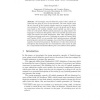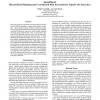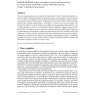1302 search results - page 18 / 261 » Deductive Plan Generation |
105
Voted
EPIA
1997
Springer
15 years 6 months ago
1997
Springer
dimension of abstraction and specificity, and they may mix both top-level goals and subgoals when describing what they want a plan to do. We show how the Prodigy planning system h...
131
click to vote
LACL
1998
Springer
15 years 6 months ago
1998
Springer
Abstract. We investigate natural deduction proofs of the Lambek calculus from the point of view of tree automata. The main result is that the set of proofs of the Lambek calculus c...
117
Voted
JAIR
2006
15 years 2 months ago
2006
Resolution is the rule of inference at the basis of most procedures for automated reasoning. In these procedures, the input formula is first translated into an equisatisfiable for...
117
click to vote
AIIDE
2007
15 years 4 months ago
2007
This paper presents an application of Hierarchical Transition Network (HTN) planning to a squad-based military simulation. The hierarchical planner produces collaborative plans fo...
143
Voted
LOGCOM
2002
15 years 2 months ago
2002
We present a logical approach to plan recognition that builds on Kautz's theory of keyhole plan recognition, defined as the problem of inferring descriptions of high-level pl...



